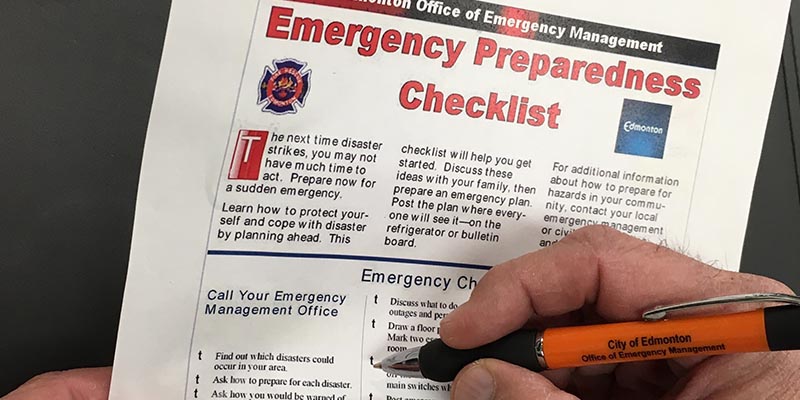Be Prepared
Each family member and out-of-area contact should have a copy of all the contact numbers. For out-of-area contacts, choose family or friends that everyone can reach in an emergency. A friend or relative who lives in another part of your community should also be listed and may be used as a contact and/or evacuation location.
Identify the following for each Household Member:
- Full name
- Name of place of work / school
- Home address
- Work / cell number
- Email address
Identify the following for each out-of-area Contact:
- Full name
- Name of place of work / school
- Home address
- Work / cell number
- Email address
If an emergency happens in your community, it may take emergency workers some time to reach you. Be prepared to take care of yourself, family and pets for up to 72 Hours.
Home Kit
- Cash and credit cards – include smaller denominations
- Ready-to-eat and high-energy food
- Manual can opener
- Bottled water or water container with at least 4 litres per person per day
- Water-purifying tablets
- Lanterns, flashlights (with extra batteries), glow sticks
- Candles with matches
- Wind-up/battery-operated radios, extra batteries and alternate heat sources
- First aid kit
- Whistle (for each member of the family)
Vehicle Kit
- Extra clothing including hats, gloves and scarves in cool seasons
- Fully-charged cell phone and a car charger for your cell phone
- Blanket
- Ice scraper and brush in winter
- Windshield washer fluid
- Booster cables
- Basic tools including a shovel
- Sand or kitty litter
- First aid kit
- Reflective triangle
- Flashlight, glow sticks
- Small candle in a tin can, waterproof matches
- Non-perishable high-energy food
- Drinking water
Evacuation Kit
- Emergency contact lists with phone numbers (for every member of your family)
- Copy of this City of Edmonton Emergency Guide
- Photos of each member of your family
- Credit cards and cash – include small denominations
- Insurance and important documents, and copies of government identification on external drive
- Prescription and non-prescription medications
- Special needs items for baby, elderly, disabled, pets
- Extra clothes
- Toiletry kit (for every member of your family)
- Rolls of toilet paper
- Whistle (for every member of your family)
- First aid kit
- Lanterns, flashlights (with extra batteries), glow sticks
- Candles and waterproof matches
- Wind-up/battery-operated radios, extra batteries and alternate heat sources
- Bottled water or water container with at least 4 litres per person per day
- Water-purifying tablets
- Non-perishable food
- Manual can opener
- Sets of utensils (for every member of your family)
- Hand sanitizer
- Garbage and recycle bags
- Games/toys to pass the time
Evacuation Pet Kit
- Photo(s) of your pet(s)
- Traveling bag or sturdy carrier and blanket
- Extra leash/harness
- Food and water
- Feeding dishes
- Medications
- Disposable litter trays (aluminum pans)
- Litter or paper towels
Can you afford to pay for damage and/or replace all your belongings at once if they were lost due to fire or water damage? Insurers will be there to help when disasters strike, but a little preparation can go a long way to minimize the impact of an emergency.
Whether you rent or own your home, when your insurance policy comes up for renewal and before you contact your insurance professional, make a list, take photos or video of the key details about your residence and belongings to ensure your property is properly protected. Store your inventory list, photos and videos on an external drive outside of your home, such as a bank safety deposit box.
If you are a post-secondary student living away from home, check with your parents’ insurance company to make sure you’re covered under their homeowner policy.
Insurance Bureau of Canada: Phone 1-800-377-6378 (Toll Free)


